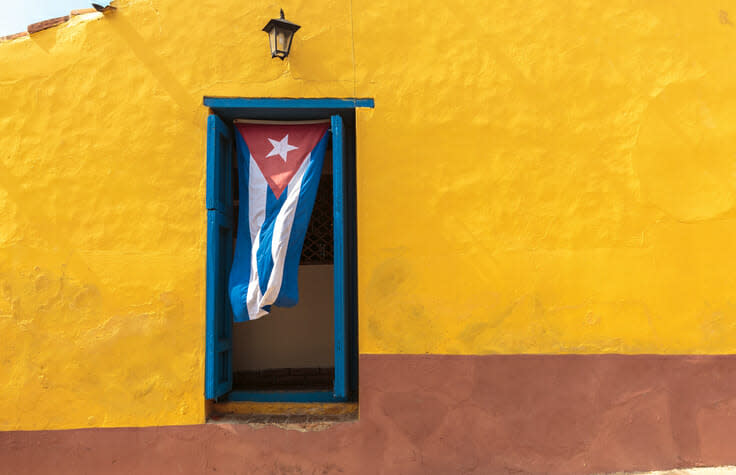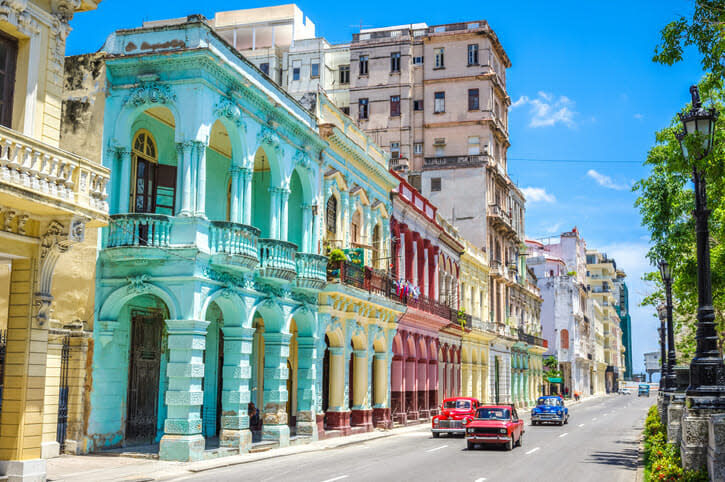Biden Wants You to Invest in Cuba, But Should You?

Biden’s administration has authorized an American license to finance and invest in a private company in Cuba. This could be the first of its kind since the beginning of the U.S. embargo on the island-nation over six decades ago. While the investment is worth a maximum of $25,000, the owner of the license says that it has opened a pathway for other American investors. But could this be a turning point that leads to wider regulation and general licensing for all private business investments in Cuba? Here’s what you need to know.
If you want to invest in Cuba, a financial advisor could help you create an investment plan for your needs and goals.
Investing in Cuba Through Private Companies
On May 10, the U.S. Treasury Department approved a license for an American company that was created by John S. Kavulich, president of the U.S.-Cuba Trade and Economic Council.
The license authorizes Kavulich to finance and invest in a private service company in Cuba. And he told SmartAsset that this could be a turning point in U.S.-Cuba legislation that opens the door to future American investments on the island through private companies.
“This is the first time that an occupant of the White House has authorized a direct equity investment and the provision of direct financing to a Cuban private company since the embargo was put in place at the end of the Eisenhower administration,” Kavulich said.
The council president explained that he put up the money to create a limited liability company (LLC) in the U.S., as well as the direct equity investment and the direct financing for the small business in Cuba, which adds up to a maximum of $25,000.
The licensing application process was submitted to the U.S. Treasury on June 10, 2021, and lasted 11 months. Now, Kavulich says that other American investors could file specific licenses to finance and invest in private businesses on the island. But the long-term goal is to institutionalize a policy for this private investment in both countries.
“This is the first license that the Cuban government has seen,” he said. “The goal isn’t that everyone needs to get their own license. The goal is that the Cuban government issue regulations to cover all private companies and the U.S. government makes this a general license.”
How Legislation Affects Investments in Cuba

While U.S. licenses could help build up small private businesses in Cuba, American investments still need to be authorized by the Cuban government. The private sector in Cuba is almost three decades old. The island government enacted a decree in 1993 that authorized the creation and operation of “cuentapropistas,” which commonly refers to self-employed and non-state workers in Cuba.
These workers are highly regulated within specific categories that were established by the Cuban government. And in recent years, Kavulich says that the island-nation has made big changes in the private sector, including the formation of LLCs, the approval of micro-, small- and medium-sized enterprises (MSMEs) and the authorization of private companies to employ up to 100 workers.
On the U.S. side, legislation has eased some restrictions again from the ongoing embargo against Cuba. The State Department announced the reversal of some Trump-era restrictions on May 16, which had limited travel to Cuba and immigration visas. U.S. policy will also ease a ban on non-family remittances to support small private businesses on the island.
Kavulich says that while American legislation could be consistent with business ideals, it has not been practical for investments. And currently, investors lose time and money on fees with legislation that forces them to rely on third countries to move investments in and out of Cuba.
“You move money through a triangle and it could take one to three days to get there with additional costs. But if you do it through direct corresponding banking you could have it within 30 minutes,” he said. “Bank transfer fees are not onerous but they are unnecessary and show a lack of understanding between policy and business. The policy wants you to do business, but it makes it less efficient and transparent than doing business in other places.”
Though U.S. licenses for Cuba, Kavulich says, could help investors streamline private business investments.
Investing in Cuba Through a Closed-End Fund
One of the ways that investors can currently invest in Cuba is through the Herzfeld Caribbean Basin Fund (CUBA), which is a closed-end fund made up of different securities from non-Cuban companies that engage in business on the island.
“Herzfeld has always been an aspirational look at Cuba,” Kavulich said. “It’s a way to invest in companies that have interaction with Cuba today or might have interaction with Cuba tomorrow. And therefore, it could be a play to gain benefit without investors being directly in Cuba.”
The fund has included airline and cruise companies, hotel chains and other companies that make money from tourism, agriculture and construction, among other industries.
Investors should note that in 2020, the fund reported cutting holdings in travel-related positions. These included:
Copa Holdings, S.A. (CPA)
Marriott Vacations Worldwide (VAC)
Norwegian Cruise Lines Holdings (NCLH)
Carnival Cruise Lines (CCL)
Royal Caribbean Cruises Ltd. (RCL)
Avianca Holdings, S.A. (AVHOQ)
It also increased exposure to defensive holdings in consumer staples and utilities sectors by adding Fresh Del Monte (FDP) and NextEra Energy (NEE).
As of Dec. 31, 2021, the fund reported that the largest portfolio positions included:
MasTec, Inc. (MTZ)
First BanCorp. (FBP)
Popular, Inc. (BPOP)
NextEra Energy, Inc. (NEE)
Martin Marietta Materials, Inc. (MLM)
PGT Innovations, Inc. (PGTI)
Aersale Corporation (ASLE)
Copa Holdings, S.A. (CPA)
Royal Caribbean Cruises Ltd. (RCL)
Cemex S.A.B. de C.V. (CX)
Almost 60% of those assets were allocated in the U.S., roughly 17% in Mexico and just over 13% in Puerto Rico.
Investors should also keep in mind that many of the companies in the fund are poised to benefit from legislation that rolls back or eliminates the embargo. And because shares are limited, the price-per-share can jump when demand increases with favorable policy announcements.
Kavulich says the authorization of U.S. licenses could create additional opportunities for investors and the fund could now set money aside to invest in private companies.
“There’s nothing preventing Herzfeld from turning some of its assets into cash for privately owned companies in Cuba that they believe has a wide path for growth,” he said. “And as of May 10, Herzfeld can now find private Cuban companies that are looking for investment.”
How to Get a License for a Private Company in Cuba
American investors interested in financing and investing in private companies on the island will have to apply for a license through the U.S. Treasury. And because the application gets shared by multiple agencies, Kavulich recommends getting professional help.
“You don’t want to hire someone who is going to learn on your money. You want to retain a lawyer who already knows the regulations and the interagency review process for a license,” he said. “That doesn’t mean you need to hire a big firm. You just need to find someone who has practical knowledge.”
In the case of Kavulich’s license, it took 11 months to process. And after getting U.S. approval, investors will still need to get authorization from the Cuban government.
“We now have one-half of the equation and there’s no expectation that this is not going to happen,” he said, referring to the U.S. license and pending Cuban authorization. “It’s just a matter of how long it’s going to take.”
Bottom Line

While the U.S. embargo on Cuba has prevented Americans from doing business with Cuban nationals and entities for more than 60 years, the Biden administration has recently rolled back Trump-era restrictions and authorized a U.S. license to finance and invest directly in private small businesses on the island. Investors, however, should note that private property and businesses have had little protections from the Cuban government in the past. And all licensed U.S. investments will still need authorization from Cuba.
For those who want to invest in the island and mitigate risk, they might be better served through the Herzfeld Caribbean Basin Fund and other investments in publicly traded companies that engage in the Cuban economy.
Tips for Foreign Investments
If you want to add foreign investments to your portfolio, a financial advisor can help you figure out the best options. SmartAsset’s free tool matches you with up to three financial advisors who serve your area, and you can interview your advisor matches at no cost to decide which one is right for you. If you’re ready to find an advisor who can help you achieve your financial goals, get started now.
Foreign investments could be a good source of income. Here’s what you need to know about paying U.S. taxes on foreign income.
Photo credit: ©iStock.com/Sabinoparente, ©iStock.com/Nikada, ©iStock.com/Eloi_Omella
The post Biden Wants You to Invest in Cuba appeared first on SmartAsset Blog.

 generic
generic 